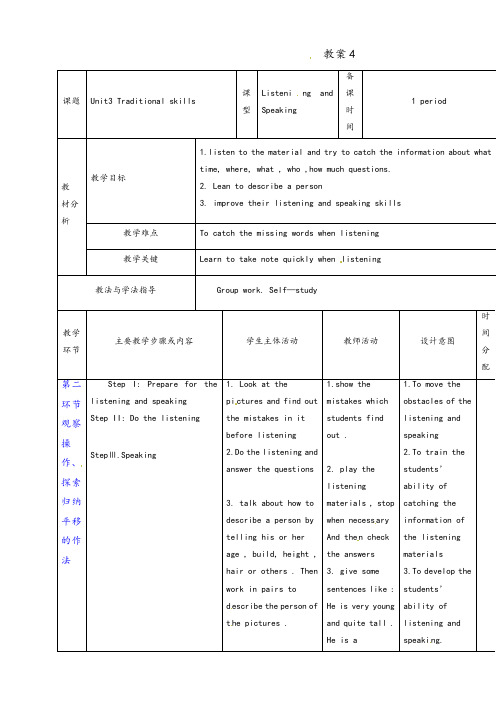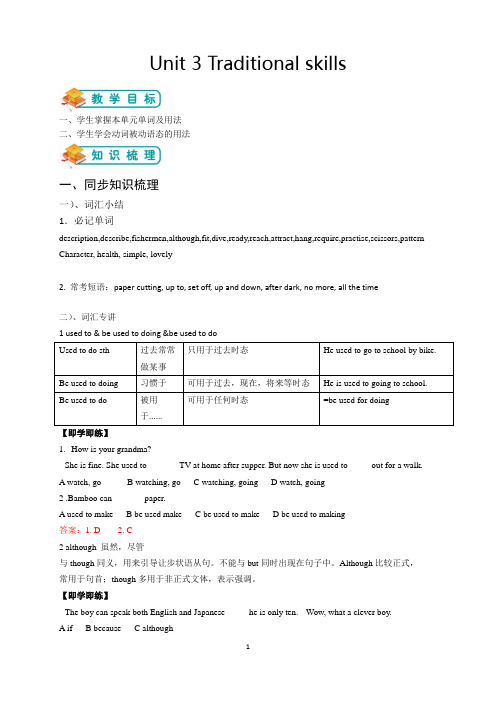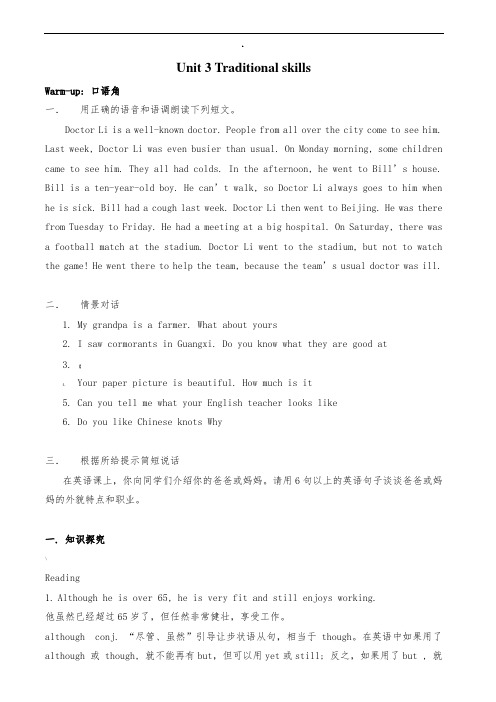深圳新版八下英语 Unit 3 Traditionalskills (语法,被动语态)
牛津深圳版八年级英语下册Unit3Traditionalskills优质教案ListeningandSpeaking

堂
教
学
流
程
Prepare for listening→Listening→Speaking→summa ry
效
果
评
价
与
反
思
教法与学法指导
Group work. Self—study
教学环节
主要教学步骤或内容
学生主体活动
教师活动
设计意图
时间
分配
第二环节 观察操作、 探索归纳平移的作法
Step I: Prepare for the listening and speaking
Step II: Do the listening
第四环节 课时小结
StepⅥSum up
6.Know how to describe a person
e ppt to hel p the m sum up
6.Help them to cultivate the ability of summarizing.
第五环节 课后作业
Make a dialogue in written way to talk about how a cat help people
1.To move the obstacles of the listening and speaking
2.To train the students’ ability of catching the information of the listening materials
3.To develop the students’ abiliபைடு நூலகம்y of listening and speaki ng.
第三环节 课堂练习
八年级下册深圳牛津版Unit 3 Traditional skills 语法:被动语态(共18张PP

分析句子
动作执行者 谓语动词 动作承受者 He gives me a gift. A gift is given to me by him. My mother takes care of me well. I am taken care of well by my mother.
一般现在时的被动语态
谢谢聆听
Unit 3 Traditional skills语法 不同时态中的被动语态
被动语态的用法
1. 不知道动作的执行者是谁; The window was broken last night. 2. 没有必要指出动作的执行者; Many trees must be planted every year. 3. 为了强调或突出动作的承受者; Li Hua was chosen as our monitor. 4. 不便说出动作的执行者; My watch has been stolen.
分析句子
动作执行者
谓语动词 动作承受者
He gave me a gift last week.
A gift was given to me by him last week.
My mother told us not to lie.
We were told not to lie (by my mother).
动作承受者+ is/am/are +动词过去分词 +by+动作执行者
变成被动语态
We clean the classroom The classroom is cleaned
every day.
(by us) every day.
He gave me a gift last week. A gift was given to me by him last week. My mother told us not to lie. We were told not to lie (by my mother).
Unit 3 Traditional skills (词汇+语法)牛津深圳版八下( 含答案)

Unit 3 Traditional skills一、学生掌握本单元单词及用法二、学生学会动词被动语态的用法一、同步知识梳理一)、词汇小结1.必记单词description,describe,fishermen,although,fit,dive,ready,reach,attract,hang,require,practise,scissors,pattern Character, health, simple, lovely2. 常考短语:paper cutting, up to, set off, up and down, after dark, no more, all the time二)、词汇专讲1 used to & be used to doing &be used to do只用于过去时态He used to go to school by bike. Used to do sth 过去常常做某事Be used to doing 习惯于可用于过去,现在,将来等时态He is used to going to school. Be used to do 被用可用于任何时态=be used for doing于......【即学即练】1.--How is your grandma?--She is fine. She used to _______TV at home after supper. But now she is used to _____out for a walk.A watch, goB watching, goC watching, goingD watch, going2 .Bamboo can _______paper.A used to makeB be used makeC be used to makeD be used to making答案:1. D 2. C2 although 虽然,尽管与though同义,用来引导让步状语从句。
牛津深圳版八年级英语下册《Unit 3 Traditional skills》教案:Grammar

教案5课题Unit 3 Traditional skills 课型Grammar备课时间1 period教材分析教学目标1. Master the passive voice in the simple present tenseand in the simple past tense tense .教学重点be seen , be made , be taken , be checked , becontrolled , be brought up教学难点be chosen, be interview, be used教学关键Make it clear about the structure of the passive voice 教法与学法指导Cooperating, Self-study教学环节主要教学步骤或内容学生主体活动教师活动设计意图时间分配第一环节复习回顾平移的基本性质,引入课题StepⅠ:Free talk 1. Damin usescormorants tocatch fish.Cormorants areused to catch fishby Damin.No nets arerequired forthis .1.Show moresentenceswith thepassive voicein the simplepresenttense.1. To arousethestudents’interest inlearningaboutreflexivepronouns5第二环节StepⅡ: learn about thepassive voice in thesimple present tense2. Find out therules of thepassive voice ofthe simple presenttense .Then usethe correct forms2. show morepastparticipleforms of theverbs2.letstudents knowhow to usethe passivevoice insimple15观察操作、探索归纳平移的作法StepⅢ: more practiceStep IV : PartBof the words andphrases .3. according tothe pictures andthen sum up therules about thepassive voice inthe simple presenttense.4.learn thepassive voice inthe simple pasttense3. sum up therules4. Show moresentences ofthe passivevoice of thesimple pasttensepresenttense.3.know moreabout theusage ofpassive voice4. master theusage of thepassive voicein the simplepast tense第三环节课堂练习Step Step V: morepractice5.finish theexercise given byteacher andpractice the usageof the passivevoice5. hand outthe sheetsand letstudentsfinish theexercise init5.To consolidatewhat theyhave learnedin this class10第四环节课时小结StepⅥ:Sum up 6. Go over therules of thepassive voice6. Show a pptto guide thestudents togive sum upof the class6.To makestudents havea good habitof takingnotes andhave ageneralunderstandingof this class5第五环节课后作业Finish the exercise in the English paper.。
八年级下册unit3Traditionalskills知识点归纳

八年级下册unit3Traditionalskills知识点归纳unit 3 traditional skillsI 重点单词(词性变化)1. describe (v.) --- description (n.) 描述2. dive (v.) --- diving (现在分词) --- diver (名词)3. require (v.) --- requirement (n.)4. luck (n.) --- lucky (adj.) --- luckily (adv.) = fortunate (adj.)5. health (n.) --- healthy (adj.)6. hang (v.)--- hung (过去式)--- hung (过去分词)7. love (n/v)--- lovely (adj.) 8. reach --- reaches (三单)9. attract (v.)--- attraction (n.) 10. fisherman --- fishermen (复数)11. simple(adj.)--- simply (adv.)II 同义词(组)1. fit = healthy and strong 健壮的2. set off = start = set out 出发2. reach= arrive at/ get to 到达 4. hang = put it on 悬挂5. require = need 需要6. dive down= go deeper underwater 潜入7. simple = easy 简单8. although= though 虽然9. describe = say what something is like 描述10. lovely = attractive 有吸引力的11. scissors = something used to cut paper 12. no more = not…any more13. all the time = all the way = from the beginning to the endIII 重点短语1. up to 到达2. set off 出发3. up and down 起伏4. after dark 天黑后5. no more 不再6. all the time 一直7. dive down 潜入8. a piece of grass 一根草9. during the day 在白天10. tie…to 11. use sth. to do sth 12. stop sb. from doing sth13. in the late afternoon 黄昏时分14. get ready for 为…做准备15. push…into 把…推进…16. bring…back 把…带回17. throw …into 把…扔进18. at the front of…在…前面19. turn…into…把…变成IV 重点句子1. Although he is over 65, he is very fit and still enjoys working.虽然他已年过65 岁,但身体健康,依然喜欢劳作。
牛津深圳版八下Unit-3-Traditional-skills词汇短语精讲(包含答案)

Unit 3 Traditional skillsWarm-up: 口语角一.用正确的语音和语调朗读下列短文。
Doctor Li is a well-known doctor. People from all over the city come to see him. Last week, Doctor Li was even busier than usual. On Monday morning, some children came to see him. They all had cold s. In the afternoon, he went to Bill’s house. Bill is a ten-year-old boy. He can’t walk, so Doctor Li always goes to him when he is sick. Bill had a cough last week. Doctor Li then went to Beijing. He was there from Tuesday to Friday. He had a meeting at a big hospital. On Saturday, there was a football match at the stadium. Doctor Li went to the stadium, but not to watch the game! He went there to help the team, because the team’s usual doctor was ill.二.情景对话1.My grandpa is a farmer. What about yours2.I saw cormorants in Guangxi. Do you know what they are good at3.【4.Your paper picture is beautiful. How much is it5.Can you tell me what your English teacher looks like6.Do you like Chinese knots Why三.根据所给提示简短说话在英语课上,你向同学们介绍你的爸爸或妈妈。
广州深圳八下英语知识点总结与讲练 UNIT-3-Traditional skills

1.paper cutting 剪纸2. up to 到达(某数量、程度等);至多有3. set off /out 出发4.set out/off for 出发去...5. up and down 起伏;上下波动6.after dark 天黑后;黄昏后7.no more 不再;再也不8. all the time (在某段时间内)一直;始终9. a kind of 一种10. tie...around 拴...在...周围tie...to 拴...在...上12.at the front of 在...前面13.throw...in to 把...扔进14. look up 抬头看15. bring up 抚养;养育;16. turn...in to 把...变成17.put on 上演18.cut out 剪成19. the shape of 以...的形状20. get one’s attention得到某人的关注21.put up 张贴;挂Ⅲ重点句型1.Although he is over 65, he is very fit and still enjoys working. 尽管他已经年过65岁,但他非常健康,并且仍然喜欢工作。
2.They are good a t catching fish because they can swim well. They can dive down and stay under the water for up two minutes. 他们非常擅长抓鱼因为他们游泳很好,他们能够潜入海底并且在海里停留2分钟。
3.In 50 years, perhaps there will be no more cormorant fisherman in the world.50年后,世界上可能不再有以鸬鹚捕鱼的渔民了。
4.What do cormorants look lik e? = What are cormorant like? 鸬鹚是长什么样子的?5.Damin uses several ways to attract fish. 大民用几种方法来吸引鱼。
牛津深圳版八年级英语下册《Unit 3 Traditional skills》教案:Writing

教案6课题Unit3 Traditional skills 课型Writing备课时间1 Period教材分析教学目标1.To know how to write a passage to describe a personand introduce a traditional skills教学重点Should contain the person’s age, build, height, his orher special ability教学难点to describe a person’s special skills教学关键know the person well and seize the special skills 教法与学法指导Self-study, Cooperation, Group work.教学环节主要教学步骤或内容学生主体活动教师活动设计意图时间分配第一环节复习回顾平移的基本性质,引入课题StepⅠ:Free talk andpreparation for writing1. Talk with yourclassmates aboutthe person youwant to describe1. show some 1.To arousetheirinterestabout theclass 5第二环节观察操作、探StepⅡ: Read the passage 3. Read thepassage and findout some usefulsentences andphrases which canhelp you in yourwriting . Then3.helpstudents tomark down theimportantpoints aboutthe Mr Chen.3.To traintheir abilityto express aswell asimprove theirspeakingability and10索归纳平移的作法answer the questions below.to get readyfor thewriting and train their ability to cooperate.第三环节课堂练习Step III: WritingStep IV: Check the passage 4.Write a passage todescribe a personaccording to the tipsgiven . Tryto use the passive voice in your passage ..4.remind students to pay attention totheir handwriting and check themistakes students make4.To train the students ’writing ability.15第四环节课时小结Step five Sum up How to organize thewriting.5. sum up what you need to cont ain in your passage when wri ting an animal you love5.List the beautiful sentences they write in the passages5.Let them get familiar with the writ ing. 5。
- 1、下载文档前请自行甄别文档内容的完整性,平台不提供额外的编辑、内容补充、找答案等附加服务。
- 2、"仅部分预览"的文档,不可在线预览部分如存在完整性等问题,可反馈申请退款(可完整预览的文档不适用该条件!)。
- 3、如文档侵犯您的权益,请联系客服反馈,我们会尽快为您处理(人工客服工作时间:9:00-18:30)。
Unit 3 Traditional skills(语法:被动语态)一、找出Reading部分和Practice部分含有am/is/are done, was/were done, will be done的句子,并试着对句子进行翻译,发现其中的规律Eg: 1. The fish are then taken and thrown into a big basket by Daming.2. Cormorant fishing was once practised in lots of places in South-East China.3. A music show will be held in the school hall at 4 p.m on Tuesday, 4 May.......总结一般现在时、一般过去时和一般将来时被动语态的构成一般现在时:_____________________________________一般过去时:_____________________________________一般将来时:_____________________________________二、被动语态的概念:表示动作与主语之间是被动关系的句子是被动语态三、主动语态与被动语态之间如何转换Eg:We visited the factory last summer. →主动语态主语谓语宾语状语The factory was visited by us last summer. →被动语态主语谓语宾语状语歌诀助记1.主动、被动的时态要一致。
1)Tom often give me gifts.2)We visited the factory last year.3)He read the novel.4)We will plant a lot of trees on the hill next year.2.变成的被动语态的主语与谓语在单复数上保持一致。
He puts the books on the desk.3.省略by短语的几个条件1)不知道、没有必要说出动作执行者时。
Rice is grown well there。
2)强调说明动作的承受者时。
I was sent to teach them English.3)汉语中有“据说,大家说”等时。
It is said that one day he climbed to the top of a house.四、被动语态的使用条件1. 不知道动作由谁发出Three people were injured in the traffic accident.2. 由于某种原因没有必要说明动作的发出者。
This book was published in 2000.3. 需要突出或强调动作的承受者。
This play was written by Shakespeare.跟踪练习1. My homework ________an hour ago. A. finish B. finished C. was finished2. The shoes _________ in Guangdong. A. make B. are made C. made3. Lots of trees ___________in the forest last year. ( plant )4. Lucy borrowed a book yesterday. (变为被动语态)______________________________________________________________五、句型转换1.My homework was finished two hours ago.否定句____________________________________________________一般疑问句_________________________________________________肯定回答____________________________________________________否定回答____________________________________________________2.The shoes are made in Guangdong.否定句____________________________________________________一般疑问句_________________________________________________肯定回答____________________________________________________否定回答____________________________________________________3.The volunteers will be sent to Africa to help the people there.否定句____________________________________________________一般疑问句_________________________________________________肯定回答____________________________________________________否定回答____________________________________________________4.The bridge is going to be built by the worker next year.否定句______________________________________________________一般疑问句__________________________________________________肯定回答____________________________________________________否定回答____________________________________________________Homework一、造句. 用“the workers build the bridge”造一般现在时、一般过去时和一般将来时的句子,并改成被动语态,并对含被动语态的句子进行句型转换。
1.一般现在时主动句______________________________________________________被动句______________________________________________________否定句______________________________________________________一般疑问句__________________________________________________肯定回答____________________________________________________否定回答____________________________________________________2.一般过去时主动句_______________________________________________________被动句______________________________________________________否定句______________________________________________________一般疑问句__________________________________________________肯定回答____________________________________________________否定回答____________________________________________________3.一般将来时主动句_______________________________________________________被动句_______________________________________________________否定句______________________________________________________一般疑问句__________________________________________________肯定回答____________________________________________________否定回答____________________________________________________二、句型转换1. He didn’t go for a walk after dinner any more. (改为同义句) He __________ ___________ went for a walk after dinner.2. I know him, but I don’t know where he lives. (改为同义句) _________ I know him, I don’t know where he lives.3. I’ll call you as soon as I arrived in HK. (改为同义句) I’ll call you as soon as I _________ in HK.4. When did he set out last night? (改为同义句) When did he _______ _________ last night?5.She put the camera on the bed just now. (改为被动语态)The camera _________ __________on the bed by her just now.三、单项选择( )1. That building now. A. is building B. is built C. is being built D. builds( )2. The trees in our school every Friday afternoon .A. are wateredB. are wateringC. have wateredD. water( )3. Yesterday a visitor something about his hometown .A. was askedB. was askingC. is askedD. asked( )4. Paper first invented in China . A. is B. are C. was D. Were( )5. He arrived in Beijing, where he _____ his friend. A. was met by B. was met C. was meeting D. met by ( )6. The mistakes in the exercises will _____ the teacher.A. crossB. be crossingC. be crossed byD. cross by( )7. Each year quiet a lot of food _______ around the world.It’s really time for us to do something.A. was wastedB. is wastedC. wastedD. will be wasted( )8. It is said that a new museum ________ in our city next year.A. buildsB. is buildingC. will be builtD. was built( )9. Flowers _______ along the road last year.A. plantB. plantedC. are plantedD. were planted( )10. Annie ____ to the party. She had a good time.A. invitesB. is invitedC. was invitedD. has invited四、阅读理解Waste can be seen everywhere in the school. Some students ask for more food than they can eat and others often forget to turn off the lights when they leave the classroom. They say they can afford these things. But I don't agree with them.Waste can bring a lot of problems. Although China is rich in some resources(资源),we are short of(缺乏)others,for example,fresh water(淡水)。
